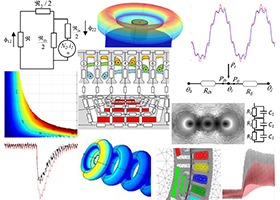- 3.2Impact Factor
- 7.3CiteScore
- 17 daysTime to First Decision
Modeling and Optimal Design of Electromagnetic Devices
This special issue belongs to the section “F: Electrical Engineering“.
Special Issue Information
Dear Colleagues,
We are inviting submissions to a Special Issue of Energies on the subject area of "Electromagnetic Devices Modeling", and related topics. Electromagnetic devices are widely applied in many sectors, including general industry, medical facilities, electrical substations, automotive, railway, aeronautics, aerospace or military among others. Emerging areas such as the Internet of Things require distributed sensor systems and energy harvesters, which include different types of electromagnetic devices. Electromagnetic devices are also critical components in different renewable energy applications such as wind, wave and tidal energy harvesting. Electromagnetic devices also play a leading role in road, maritime and air electric transportation and mobility systems. Many of these applications require specific designs, advanced materials or the use of accurate modelling tools in order to fulfil strict requirements such as enhanced energy efficiency, extended useful life, high reliability, compatibility with fault diagnosis approaches or the possibility of fault tolerant operation among others. There is growing interest in designing and testing digitally some of these devices before they are physically produced, so digital twins will play a key role in these developments. From this perspective the technologies currently associated with modelling, simulation and optimal design are receiving much interest. On the other hand, although substantial advances have been done in recent years in this field, there are still significant challenges to de addressed related to the implementation of fast and cost-effective modelling and optimal design tools. From this perspective, this Special Issue seeks to contribute in these areas through state-of-the-art scientific and multi-disciplinary works, aiming to improve knowledge and performance in the areas of modelling and optimal design of electromagnetic devices. We strongly encourage papers providing innovative technical developments, reviews, case studies, and analytics, as well as assessments and manuscripts targeting different disciplines, which are relevant to modelling and optimal design of electromagnetic devices and to the associated advances and challenges.
- Advanced modeling tools
- Optimal design tools
- Optimization methods applied to design electromagnetic devices
- Ultra-fast finite element methods applied to electromagnetic devices
- Computational electromagnetics applied to electromagnetic devices
- Electromagnetic devices for electric transportation systems
- Electromagnetic devices for aerospace applications
- Electromagnetic devices for renewable energy systems
- Modeling and optimal design of electrical machines
- Modeling and optimal design of harvesters for wind, wave and tidal energy
- Digital twins applied to electrical traction systems and energy harvesters
- Modeling and design of electromagnetic devices for high-voltage applications
- Design and modeling of fault tolerant electromagnetic devices
- Design and modeling of electromagnetic devices for IoT applications
- Design and modeling of electromagnetic devices for electromobility applications
Prof. Dr. Jordi-Roger Riba
Guest Editor
Manuscript Submission Information
Manuscripts should be submitted online at www.mdpi.com by registering and logging in to this website. Once you are registered, click here to go to the submission form. Manuscripts can be submitted until the deadline. All submissions that pass pre-check are peer-reviewed. Accepted papers will be published continuously in the journal (as soon as accepted) and will be listed together on the special issue website. Research articles, review articles as well as short communications are invited. For planned papers, a title and short abstract (about 250 words) can be sent to the Editorial Office for assessment.
Submitted manuscripts should not have been published previously, nor be under consideration for publication elsewhere (except conference proceedings papers). All manuscripts are thoroughly refereed through a single-blind peer-review process. A guide for authors and other relevant information for submission of manuscripts is available on the Instructions for Authors page. Energies is an international peer-reviewed open access semimonthly journal published by MDPI.
Please visit the Instructions for Authors page before submitting a manuscript. The Article Processing Charge (APC) for publication in this open access journal is 2600 CHF (Swiss Francs). Submitted papers should be well formatted and use good English. Authors may use MDPI's English editing service prior to publication or during author revisions.
Keywords
- Modeling
- Optimal design
- Optimization
- Simulations
- Finite element methods
- Computational electromagnetics
- Digital twins
- Electrical machines
- Electromagnetic actuators
- Energy harvesters
- High-voltage systems
- Data processing
- Electromobility
- Aircraft applications
- Renewable energy

Benefits of Publishing in a Special Issue
- Ease of navigation: Grouping papers by topic helps scholars navigate broad scope journals more efficiently.
- Greater discoverability: Special Issues support the reach and impact of scientific research. Articles in Special Issues are more discoverable and cited more frequently.
- Expansion of research network: Special Issues facilitate connections among authors, fostering scientific collaborations.
- External promotion: Articles in Special Issues are often promoted through the journal's social media, increasing their visibility.
- e-Book format: Special Issues with more than 10 articles can be published as dedicated e-books, ensuring wide and rapid dissemination.

